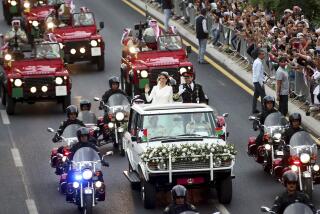Sudanese Opt for Group-Rate Weddings
- Share via
WAWISI, Sudan — The military government has entered the marriage business, sponsoring mass weddings to replace the lavish affairs few couples can afford in a nation ravaged by war and drought.
Sudanese couples line up by the hundreds, hands clasped under handkerchiefs, to exchange vows.
“I highly recommend this type of marriage,” said Abdel-Azim Abdel-Kader, 26. “It’s simple,” he added, and much cheaper than the “bad custom” of spendthrift weddings.
Abdel-Kader and his childhood sweetheart, Aziza Rayah, were among 151 couples married collectively at Wawisi, a 90-minute drive north of Khartoum. They had been engaged for a year and could not afford an elaborate ceremony.
The custom of extravagant weddings developed over the last 30 years as Sudanese took jobs in the Persian Gulf oil states, made fortunes by local standards, then returned home to marry.
In recent years, the rite came to include several days of festivities, the slaughter of animals and other lavish displays of wealth. Dowry and other expenses could run the cost of a middle-class wedding to $10,000, a sum beyond even the imaginations of most Sudanese.
Workers returning from abroad “introduced new values, and now we are paying the price,” said Alwayia Adam, who is 28 and unmarried. Having an inexpensive but proper wedding came to be “ridiculed rather than cherished as an Islamic value,” she said.
Sudanese used to marry at 18 or younger, but as the expense has risen, so has the average age, to the late 20s.
In June, the military regime devised the mass-wedding plan, financed by the government, private donors and Islamic organizations. It is one of Lt. Gen. Omar Hassan Ahmed Bashir’s few clear successes since he seized power on June 30, 1989.
Bashir personally sponsors the program and set a goal of having 5,000 couples married by the end of the year, but the total surpassed 6,000 couples in only four months. Managers of a private fund that gave each couple a nest egg of about $335 had to cut the amount in half.
“We want to . . . enjoy life with our wives and populate Sudan,” Maj. Gen. Zubair Mohamed Salih, Bashir’s deputy, said at one ceremony.
Sudan’s economy is a shambles, with a foreign debt of $13 billion and no money to pay it off, and a civil war in the south is in its ninth year. War and poverty breed frequent famine, floods and drought on barren, neglected land.
Michel Mathar, a Christian tribal chieftain from southern Sudan driven north by the war, brought 20 Christian couples to join 480 others for a mass wedding.
“I would have remained single for years had it not been for this project,” Mathar said.
The Wawisi ceremony was typical of the collective marriages.
Bridegrooms wore white turbans and long, flowing robes called djellabas , and many carried traditional Sudanese swords. Each bride wore a sari-like tobe , a bolt of red or yellow material draped around the body.
At the end of the ceremony, the couples and their families feasted on dates while singers, dancers and drummers provided entertainment.
For newlyweds, the only expense was the dowry required of the bridegroom.
Those who can afford it, like Abdel-Kader at Wawisi, pay the bride’s family the equivalent of about $35, more than a month’s salary for many Sudanese. Those who cannot pay the usual amount provide a token that may be as little as a few cents.
Asha Haj Amin of the Education Ministry said collective weddings meet a need because “the big sums needed for the traditional marriage have deterred many people.”
The project has not escaped criticism, however. Some people claim that it ignores the real problem--lack of money--that faces young couples in Sudan.
“I’m not very optimistic about the futures of these couples,” said Hassan Ali Said, a journalist who writes on social issues.
“When you don’t have a house and you can’t afford to rent one, getting married isn’t a solution to your problem. It’s a new burden.”
More to Read
Sign up for Essential California
The most important California stories and recommendations in your inbox every morning.
You may occasionally receive promotional content from the Los Angeles Times.













